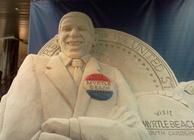 Last week Republicans took the stage in Tampa Bay Florida and formally nominated Mitt Romney as their presidential candidate and Rep. Paul Ryan as his vice presidential running mate. Now Democrats get their turn this week in Charlotte as the party gears up to nominate President Obama for re-election and set the stage for what will be a very tense campaign season. As delegates descend upon the “Queen City,” the President is slowly making his way south in anticipation of his Thursday night nomination acceptance speech at Bank of America Stadium.
Last week Republicans took the stage in Tampa Bay Florida and formally nominated Mitt Romney as their presidential candidate and Rep. Paul Ryan as his vice presidential running mate. Now Democrats get their turn this week in Charlotte as the party gears up to nominate President Obama for re-election and set the stage for what will be a very tense campaign season. As delegates descend upon the “Queen City,” the President is slowly making his way south in anticipation of his Thursday night nomination acceptance speech at Bank of America Stadium.
While this convention will be tightly scripted, historically Democrats have experienced moments of high drama in a party where there is no shortage of dissent and spontaneous outrage. In 1964 the party, just months after the tragic assassination of President John F. Kennedy in Dallas in November 1963, arrived in Atlantic City and was confronted by the Black Mississippi Freedom Democrats demanding to be seated among the all-white state delegation. That standoff resulted in the party’s delegate selection process being altered and a fundamentally more democratic convention four years later in Chicago. In the Windy City in 1968 the party was reeling from the assassination of Senator Robert Kennedy and the impact of the killing of Dr. Martin Luther King Jr., and a generational divide fueled by the Vietnam War. The convention was marred by violence as Chicago police, under the authority of Mayor Richard Daley, engaged in brutality upon protesters and delegates alike. The scene at the convention helped underscore Republican Richard Nixon’s “law and order” message and his eventual narrow victory over Democratic nominee Vice President Hubert Humphrey.
In 1972 the party’s ticket was confounded by the removal of Missouri Senator Thomas Eagleton after revelations that he had received psychological treatment. The party gathering in 1972 was also significant because Rep. Shirley Chisholm had pursued her candidacy at a time when neither African-Americans nor women were taking on the white male political establishment. Kennedy relative and Peace Corps icon Sargent Shriver was named Eagleton’s replacement and teamed with nominee Senator George McGovern; with the ticket trounced by President Nixon and Vice President Spiro Agnew. The incumbents would not complete their term as Watergate would bring the Nixon White House down and usher in a Democratic overhaul of Congress, and enabling the election of the little known governor of Georgia Jimmy Carter in 1976. Carter would face a bitter challenge himself from Senator Ted Kennedy at the 1980 convention. The conventions in 1984 and 1988 are most remembered for the candidacies of Rev. Jesse Jackson both years, with 1988 proving to be a high-water mark for Black activism as it resulted in changes to the delegate selection process, the composition of the leadership of the Democratic National Convention and the elevation of Jackson convention chairman Ron Brown to the chairmanship of the party.
There will be little of the past’s dramatics or fireworks when Democrats take to the convention floor in Charlotte. The convention this week will principally be a repudiation of the Romney-Ryan ticket and an opportunity for President Obama to regain ground among independent and undecided voters in key swing states. With polls showing the race to be in a virtual dead heat, and the economy taking center stage, the President will have to ‘sell’ his reelection as an opportunity to lead a full recovery and ease the angst of voters who are reeling from the effects of the recession. Unlike four years ago, President Obama cannot depend upon the euphoria of his historic campaign to be the nation’s first African-American in the Oval Office. His challenge today, and will be highlighted by the release of the nation’s jobs numbers on Friday, will be to convince the American public that going forward is a better option than returning to policies that were prevalent during the prior administration, and embraced for the most part by the current Republican ticket. What will be closely watched is how the Obama team redefines its message of “hope” without falling prey to Republican attacks that Americans are faring worse than four years ago.
The President will get plenty of help this week as First Lady Michelle Obama, a host of celebrities and elected officials will grace the podium to make the pitch for his re-election. Coming after several embarrassing moments for the Republicans in Tampa Bay, the Democrats will do their best to put on a show for the television and Internet viewing audience that will draw clear distinctions between their party and the GOP. The Democrats start off with the advantage of a delegate contingent that will be markedly more diverse than the Republicans and a clear gender advantage among women in support and perception. The one audience that the President will seek to assure is white males, the segment of the voting population where he is at a deficit.

today in black history
February 25, 2025
Scholar, civil rights advocate and federal judge Leon Higginbotham, Jr. is born on this date in 1928 in Trenton, New Jersey.
For Dems, Showtime in Charlotte
POSTED: September 03, 2012, 12:00 am











